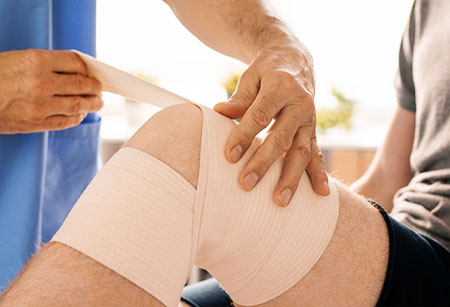Matt was stretchered off the field in the first half of the game with a serious knee injury. Zoe had to miss numerous swim comps because of a stubborn shoulder injury. And Laurie reluctantly stepped back from training for a half-marathon when his knee gave way.
These are physical injuries for which we might prescribe physiotherapy, medication, or surgery if indicated. So far, so good. But sports injuries are not only physical. They can also have a significant psychological impact, which should also be addressed as part of good care.
Sport has more than physical benefits
The physical benefits of sports are widely recognised. Regular exercise helps to reduce the risk of many serious health conditions, including high blood pressure, diabetes, and some cancers.
Sport does so much more than that though. It’s more than physical activity – it’s a lifestyle.
Along with many physical benefits, sports also:
- Provides a healthy outlet for stress
- Improves mood
- Gives shape to the week
- Promotes social connections
- Boosts energy
- Improves sleep
- Helps to control weight.
Psychological impact of a sports injury
As an athlete, you’ve probably structured your life around your sport. Each week, you devote considerable time to training. And you enjoy many physical, social, and emotional benefits as a result.
A serious injury jeopardises all that. You’re now in pain and you’ve lost your go-to coping mechanism – exercise.
As an injured athlete, you may understandably feel:
- Angry and frustrated
- Afraid that someone else will take your spot on the team
- A loss of confidence when you return to sport – you don’t feel invincible anymore!
- Scared of reinjury.
For many athletes, a sports injury is a major negative life event, which can trigger depression. Depression, in turn, may worsen sleep and may make you more likely to adopt unhelpful coping mechanisms such as drinking to excess.
Harnessing thoughts and feelings that promote recovery
Your psychological state influences your recovery.
Recovery may be slowed if you:
- Are afraid of movement – and so don’t engage in physiotherapy
- Feel depressed – while common, this is associated with poorer outcomes, higher pain levels and increased rates of post-surgical complications
- Have ‘catastrophic’ thoughts such as “There’s no way back from this!”
- Have unrealistic expectations.
Psychological factors that aid recovery include:
- A strong athletic identity
- Good self-esteem and self-belief
- Realistic expectations for recovery
- Helpful thinking patterns – “This is tough but I can get through it.”
How can your healthcare team help?
As an injured athlete keen to return to sport, you’re likely to spend a lot of time with healthcare professionals.
If your treatment team understands the psychological impact of a sports injury, they’re able to support you better. That includes keeping an eye out for signs that more support is needed.
Your treatment team can help by:
- Providing clear information about your injury and likely recovery time
- Asking about your emotional well-being following your injury
- Giving you time to talk – and listening carefully to you
- Being positive, hopeful, and reassuring
- Supporting you as you return to play – especially regarding loss of confidence or fear of re-injury.
Sometimes, it might simply mean making time for a chat – having someone ask how you’re doing can be immensely helpful. Sometimes, it might mean identifying the need for more in-depth psychological support and referring you to a professional.
The bottom line? You need a treatment team that addresses your psychological well-being as well as your physical recovery.
How can Dr Ross Radic help?
Dr Radic regularly treats elite athletes from a number of different sporting disciplines. He takes a patient-centred approach to clinical practice and enjoys taking time to get to know each patient. That means there’s time to talk about the psychological aspects of your injury and to ask for guidance on the recovery process.
Dr Radic places a strong emphasis on return to function so you can hopefully resume your sport at the right time. He provides clear prehabilitation and rehabilitation protocols to help you regain strength and confidence after an injury – and to reduce the risk of re-injury.
If you’d like to learn more, please contact us today.
Disclaimer
All information is general and is not intended to be a substitute for professional medical advice. Any surgical or invasive procedure carries risks. Dr Ross Radic can consult with you to determine if a particular treatment or procedure is right for you. A second opinion may help you decide on your options.
Sources
- Mayo Clinic, Exercise: 7 benefits of regular physical activity, https://www.mayoclinic.org/healthy-lifestyle/fitness/in-depth/exercise/art-20048389, [Accessed 9 October 2023]
- Podiatry Today, Understanding the psychology of injured athletes and returning to play, https://www.hmpgloballearningnetwork.com/site/podiatry/understanding-psychology-injured-athletes-and-returning-play, [Accessed 9 October 2023]
- Cleveland Clinic, How to mentally come back from a sports injury, https://health.clevelandclinic.org/how-to-mentally-come-back-from-a-sports-injury/, [Accessed 9 October 2023]
- Dr Adam Gledhill, The downside of sports injury: Poor mental health in injured athletes, https://www.routledge.com/rsc/downloads/The_Downside_of_Sports_Injury.pdf, [Accessed 9 October 2023]
- Boston Children’s Hospital, Not just a physical thing: The psychology of sports injuries and recovery, https://answers.childrenshospital.org/psychology-sports-injury-recovery/ [Accessed 9 October 2023]




